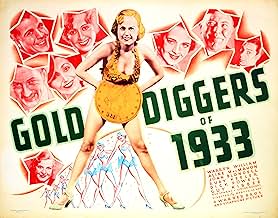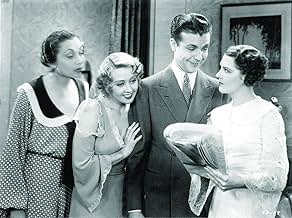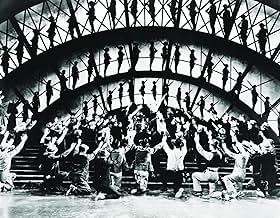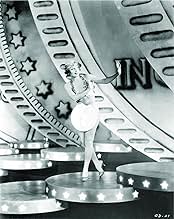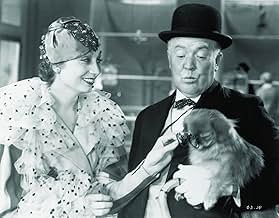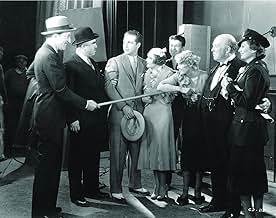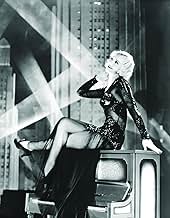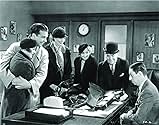NOTE IMDb
7,7/10
9,6 k
MA NOTE
Un riche compositeur vole au secours d'artistes de Broadway au chômage, en mettant sur pied un nouveau spectacle.Un riche compositeur vole au secours d'artistes de Broadway au chômage, en mettant sur pied un nouveau spectacle.Un riche compositeur vole au secours d'artistes de Broadway au chômage, en mettant sur pied un nouveau spectacle.
- Réalisation
- Scénario
- Casting principal
- Nommé pour 1 Oscar
- 4 victoires et 1 nomination au total
Robert Agnew
- Dance Director
- (non crédité)
Loretta Andrews
- Gold Digger
- (non crédité)
Monica Bannister
- Gold Digger
- (non crédité)
Bonnie Bannon
- Gold Digger
- (non crédité)
Joan Barclay
- Gold Digger
- (non crédité)
Anita Barnes
- Gold Digger
- (non crédité)
Billy Barty
- Baby in 'Pettin' in the Park' Number
- (non crédité)
Busby Berkeley
- Call Boy
- (non crédité)
Bonnie Blackwood
- Chorus girl
- (non crédité)
Eric Blore
- Clubman
- (non crédité)
Avis à la une
This is the most perfect example of "history on the silver screen" that I can think of. When Ginger Rogers says, "It's the Depression, dearie" at the beginning to explain the chorus girls' bad luck, it's the key to the whole film. While the "Shadow Waltz" number was being filmed during an actual 1933 earthquake in L.A. a number of the girls toppled off the Art Deco "overpass" where they were swaying with their filmy hoop skirts and their neon violins short-circuited. The electrical hook-ups were also rather dangerous, especially if the neon bows came in contact with the girls' metallic wigs in that number. The culminating production number, "Remember My Forgotten Man," is the most significant historically and illustrates Warner Bros.' "New Deal" sensibilities. Warner Bros. was the only studio that "bought" the whole Roosevelt approach to economic recovery. The year before, under Hoover, WWI vets were not only neglected in terms of benefits but were run out of their shanty town near the Capitol building. Starving guys were camping on the edges of most communities who'd served in the Great War fifteen years before. Of course, why or how this number fits into such a '30s girlie-type musical revue is anyone's guess. Berkeley never looked for reality, just eye-popping surrealistic effects.
About ten years ago I found myself sitting next to Etta Moten Barnett at a Chicago NAACP banquet. I was flabbergasted. She was in her 90s yet still looked lovely. She's the singer who sang "Forgotten Man" in the window. She also sang "The Carioca" in Astaire and Rogers' first pairing, "Flying Down to Rio." She was quite gracious, though she did not have wonderful things to say about Hollywood of that era. The African Americans in both pictures were fed in a tent away from the general commissary area.
Ruby Keeler has a certain odd-ball appeal, like a homely puppy. She can't sing, she watches her leaden feet while she dances, and almost all her lines are read badly. Yes, she was married to Al Jolson, but that may have HURT her career more than anything. He was not exactly always likable. He was much older than Ruby and so full of himself.
This film is also a classic example of the PRE-CODE stuff that was slipping by---the leering "midget baby" (Billy Barty), the naked girls in silhouette changing into their "armor," the non-stop flashing of underwear or lack of underwear, Ginger Rogers having her large coin torn off by the sheriff's office mug so she's essentially standing there in panties, and so forth.
A good comparison of before and after the code would be to examine this picture and "Gold Diggers of 1935." The latter is so much more chaste, discreet, and less fascinating except for the numbers. There's not the lurid, horny aura of the Pre-Code pictures. And it's not quite as much naughty fun, either.
About ten years ago I found myself sitting next to Etta Moten Barnett at a Chicago NAACP banquet. I was flabbergasted. She was in her 90s yet still looked lovely. She's the singer who sang "Forgotten Man" in the window. She also sang "The Carioca" in Astaire and Rogers' first pairing, "Flying Down to Rio." She was quite gracious, though she did not have wonderful things to say about Hollywood of that era. The African Americans in both pictures were fed in a tent away from the general commissary area.
Ruby Keeler has a certain odd-ball appeal, like a homely puppy. She can't sing, she watches her leaden feet while she dances, and almost all her lines are read badly. Yes, she was married to Al Jolson, but that may have HURT her career more than anything. He was not exactly always likable. He was much older than Ruby and so full of himself.
This film is also a classic example of the PRE-CODE stuff that was slipping by---the leering "midget baby" (Billy Barty), the naked girls in silhouette changing into their "armor," the non-stop flashing of underwear or lack of underwear, Ginger Rogers having her large coin torn off by the sheriff's office mug so she's essentially standing there in panties, and so forth.
A good comparison of before and after the code would be to examine this picture and "Gold Diggers of 1935." The latter is so much more chaste, discreet, and less fascinating except for the numbers. There's not the lurid, horny aura of the Pre-Code pictures. And it's not quite as much naughty fun, either.
10jotix100
"Golddiggers of 1933" is a fun movie to watch because all the right elements that went into the making of this motion picture. Mervyn Leroy was truly inspired, and his direction clearly shows he was in total command. The contribution made by the incomparable Busby Berkeley is one of the best things in the film. His choreography for the big production numbers is one of the most impressive thing he did for the movies.
The film is a sweet story about young hopefuls in New York trying to make it in the musical theater. Thus, we find the impoverished room mates, Carol, Trixie and Polly, who are so poor they have to steal their neighbor's milk! These young women are at the end of their rope when Barney, the Broadway impresario comes by to tell them about the new show he is working on. The only trouble, he has no money for it.
How naive and wonderful those movies that came during the great depression were! Everything was possible, in spite of what was happening in the country at the time. In fact, this film, as well as others of that era, served as an excuse for people that were facing a hard time making ends meet for escaping it all when watching a movie like this one.
The cast is excellent. Warren William, Joan Blondell, Aline McMahon, Dick Powell, Ruby Keeler, Ned Sparks, Ginger Rogers, and Guy Kibbee giving performances that endeared them to the American public of the time.
The production number of "Shadow Waltz" has to be one of the best ones in this musical genre ever produced. The number is an amazing one and a tribute to the man who staged it, Busby Berkley. It also help the chorus girls were dressed by Orry-Kelly and the music was by Harry Warren and Al Dubin.
"Golddiggers of 1933" is one of the best movies to come out of the Hollywood of those years.
The film is a sweet story about young hopefuls in New York trying to make it in the musical theater. Thus, we find the impoverished room mates, Carol, Trixie and Polly, who are so poor they have to steal their neighbor's milk! These young women are at the end of their rope when Barney, the Broadway impresario comes by to tell them about the new show he is working on. The only trouble, he has no money for it.
How naive and wonderful those movies that came during the great depression were! Everything was possible, in spite of what was happening in the country at the time. In fact, this film, as well as others of that era, served as an excuse for people that were facing a hard time making ends meet for escaping it all when watching a movie like this one.
The cast is excellent. Warren William, Joan Blondell, Aline McMahon, Dick Powell, Ruby Keeler, Ned Sparks, Ginger Rogers, and Guy Kibbee giving performances that endeared them to the American public of the time.
The production number of "Shadow Waltz" has to be one of the best ones in this musical genre ever produced. The number is an amazing one and a tribute to the man who staged it, Busby Berkley. It also help the chorus girls were dressed by Orry-Kelly and the music was by Harry Warren and Al Dubin.
"Golddiggers of 1933" is one of the best movies to come out of the Hollywood of those years.
With the success of "42nd Street," Warner Brothers wasted no time adding Busby Berkeley musical numbers to "Gold Diggers of 1933."
Starring Dick Powell and Ruby Keeler, this musical also has some of the same Depression darkness that permeated "42nd Street." "It's the Depression, dearie," Ginger Rogers says as the show she and her fellow chorines are laboring in closes in rehearsal due to lack of funding.
However, Brad (Powell), a composer in a nearby apartment who's sweet on Polly (Keeler), offers to give Ned Sparks the money he needs to produce his new show. His only condition is that Polly be featured.
Everyone wonders where he got the money, and a news item plus the fact that he refuses to appear in the show make the girls suspicious that he's a bank robber. In fact, he's the scion of a wealthy man (Warren William), who soon appears on the scene with his attorney (Guy Kibbee) when Brad steps in for the lumbago-ridden juvenile lead.
Polly's roommates Trixie and Carol (Joan Blondell and Aline MacMahon) go to work on the two immediately.
Though the film has some fantastic numbers - "We're in the Money," "The Shadow Waltz," "Pettin' in the Park," and great Busby Berkeley choreography, the middle section has no music and drags on as the gals meet the men, get them to pay for expensive hats, etc. This is probably because the film was completed when the musical numbers were added.
But the final number is worth the whole film. "Remember Your Forgotten Man" is a tribute to the World War I soldiers now out of work in the Depression, and not only are the production effects and choreography fantastic, but the singing as well, particularly the solo work by Etta Morton. Blondell, who from the sound of it in Dames was completely tone deaf, is beautifully dubbed here.
Ginger Rogers shines in a supporting role especially with her pig Latin lyrics to "We're in the Money" which were added after she was heard fooling around in a rehearsal. Powell is in gorgeous voice in all the numbers, but "I've Got to Sing a Torch Song" is a high point.
It's easy to watch the dancing, the beautiful women in their costumes, and listen to the singing and forget what in fact was going on in the '30s - after all, that's why these films were made.
But the "Forgotten Man" number serves as a reminder then and today that for the people sitting in the theaters, their troubles were right outside the door.
Starring Dick Powell and Ruby Keeler, this musical also has some of the same Depression darkness that permeated "42nd Street." "It's the Depression, dearie," Ginger Rogers says as the show she and her fellow chorines are laboring in closes in rehearsal due to lack of funding.
However, Brad (Powell), a composer in a nearby apartment who's sweet on Polly (Keeler), offers to give Ned Sparks the money he needs to produce his new show. His only condition is that Polly be featured.
Everyone wonders where he got the money, and a news item plus the fact that he refuses to appear in the show make the girls suspicious that he's a bank robber. In fact, he's the scion of a wealthy man (Warren William), who soon appears on the scene with his attorney (Guy Kibbee) when Brad steps in for the lumbago-ridden juvenile lead.
Polly's roommates Trixie and Carol (Joan Blondell and Aline MacMahon) go to work on the two immediately.
Though the film has some fantastic numbers - "We're in the Money," "The Shadow Waltz," "Pettin' in the Park," and great Busby Berkeley choreography, the middle section has no music and drags on as the gals meet the men, get them to pay for expensive hats, etc. This is probably because the film was completed when the musical numbers were added.
But the final number is worth the whole film. "Remember Your Forgotten Man" is a tribute to the World War I soldiers now out of work in the Depression, and not only are the production effects and choreography fantastic, but the singing as well, particularly the solo work by Etta Morton. Blondell, who from the sound of it in Dames was completely tone deaf, is beautifully dubbed here.
Ginger Rogers shines in a supporting role especially with her pig Latin lyrics to "We're in the Money" which were added after she was heard fooling around in a rehearsal. Powell is in gorgeous voice in all the numbers, but "I've Got to Sing a Torch Song" is a high point.
It's easy to watch the dancing, the beautiful women in their costumes, and listen to the singing and forget what in fact was going on in the '30s - after all, that's why these films were made.
But the "Forgotten Man" number serves as a reminder then and today that for the people sitting in the theaters, their troubles were right outside the door.
with 42nd Street and Footlight Parade... Snappy, risqué, funny, great cast, great music. What more could you ask for? Joan Blondell, Aline McMahon, and Ruby Keeler are the gold diggers. Warren William, Dick Powell, and Guy Kibbee are their targets. Ginger Rogers is swell singing "We're in the Money" in Pig Latin. Ned Sparks, Sterling Holloway, Charles Lane, and Billy Barty are good. Great musical numbers including the opening "We're in the Money," the terrific finale "Forgotten Man" with Blondell and Etta Moten (singing in the window); "Petting in the Park" and "In a Shadow"---Powell and Keeler.... all classics. Fun all the way......
Look for Hobart Cavanaugh, Grace Hayle, Busby Berkley, Clarence Nordstrom, and one of the roller skating cops sure looks like Jack Carson.
Aline McMahon steals the show, and what a show it is!
Look for Hobart Cavanaugh, Grace Hayle, Busby Berkley, Clarence Nordstrom, and one of the roller skating cops sure looks like Jack Carson.
Aline McMahon steals the show, and what a show it is!
Made in the year when the global economic crash hit rock bottom, and the first signs of recovery began to appear, 'Gold Diggers' is very much a product of the Depression. Bread lines and penury are all around, but there is a jaunty air of optimism, too: "the long-lost dollar has come back to the fold".
Polly, Trixie and Carol are three vivacious and attractive showgirls who room together and scrape a precarious living by getting hired for each new Broadway musical as it crops up, and riding their luck until it closes - which is often before it even opens. On the fringe of their group hovers Fay, the smart blonde with the waspish tongue (Ginger Rogers).
The girls are 'gold diggers' in that they waste no opportunity to batten onto rich men. It is hinted during the course of the film that showgirls inhabit a shadowy region on the borders of prostitution, and the harsh economic realities of 1933 force the girls to regard their good looks as a marketable commodity.
A kind of innocent carnality runs through the film. Our three heroines actually sleep together. Fay thinks nothing of changing clothes with Carol, and she gets her backside slapped several times - by both men AND women. Trixie bathes with the door wide open, while Carol preens herself in the scantiest of negligees. The girls contrive to embarrass a rich snob by having him wake up undressed in Carol's bed. The script is loaded with playful smuttiness - taking 'Back Bay codfish' for a ride, making bedroom eyes and so forth.
It is in the show numbers, however, that the real naughtiness is on display. Busby Berkeley had had a phenomenal impact earlier in the year with his staged routines for "42nd Street", and a similar (but more risque) format is used here. Girls strip naked in silhouette, Ginger sings and dances all but nude for "We're In The Money", and metal chastity bodices are breached using can openers.
Ruby Murray and Dick Powell once again team up as the ingenue lovers, this time playing Brad and Polly - "a knockout for the mush interest". Murray is all coy charm and Powell's tenor voice is magnificent. Ginger is, as always, a beautiful and intelligent performer. Watch her pull off the gibberish verses in 'Money', and breezing through the comic dialogue in the apartment scene. Joan Blondell as Carol is simply adorable. Her sad face during the trick played on Lawrence is enough to tell us that she is falling in love. Her performance as The Spirit Of The Depression in "My Forgotten Man" is one of the great images in cinema history.
Warren and Dubin wrote the songs - and what songs! There are amusing, playful numbers like "Pettin' In The Park", with Berkeley choreography to match, and "We're In The Money" is deservedly famous. "In The Shadows" is a lovely ballad, with a set of geodesic walkways and electrically-illuminated violins. The spine-tingling climax is the anthemic "My Forgotten Man".
"Pettin' In The Park" was originally intended to be the closing number (hence Polly in her park outfit during the final reel), but the running-order was changed. A reprise of "Pettin'" as aural wallpaper in the restaurant scene is an understated gem, with a lovely arrangement featuring muted cornets. In a nice little in-joke, the producer likes Brad's songs so much, he decides to fire Warren and Dubin. By the way - who is the girl who sits silently in the armchair throughout that long scene?
The conception for "My Forgotten Man" was "men marching, marching, marching!" A sweeping epic is told in song and action as we see breadlines, tenements, Great War doughboys and much, much more - all in one song! Joan Blondell deters the heartless cop by pulling back the bum's lapel in a vignette of great emotional power. The musical styles range through torch song, jazz, blues and more. Listen out for the trumpet's counter melody as Joan speaks the verses, the negress on the window sill with the divine alto voice, the clarinet and sax obbligato after each sung line, and the gospel-style descant. "Gee, don't it get ya?"
Polly, Trixie and Carol are three vivacious and attractive showgirls who room together and scrape a precarious living by getting hired for each new Broadway musical as it crops up, and riding their luck until it closes - which is often before it even opens. On the fringe of their group hovers Fay, the smart blonde with the waspish tongue (Ginger Rogers).
The girls are 'gold diggers' in that they waste no opportunity to batten onto rich men. It is hinted during the course of the film that showgirls inhabit a shadowy region on the borders of prostitution, and the harsh economic realities of 1933 force the girls to regard their good looks as a marketable commodity.
A kind of innocent carnality runs through the film. Our three heroines actually sleep together. Fay thinks nothing of changing clothes with Carol, and she gets her backside slapped several times - by both men AND women. Trixie bathes with the door wide open, while Carol preens herself in the scantiest of negligees. The girls contrive to embarrass a rich snob by having him wake up undressed in Carol's bed. The script is loaded with playful smuttiness - taking 'Back Bay codfish' for a ride, making bedroom eyes and so forth.
It is in the show numbers, however, that the real naughtiness is on display. Busby Berkeley had had a phenomenal impact earlier in the year with his staged routines for "42nd Street", and a similar (but more risque) format is used here. Girls strip naked in silhouette, Ginger sings and dances all but nude for "We're In The Money", and metal chastity bodices are breached using can openers.
Ruby Murray and Dick Powell once again team up as the ingenue lovers, this time playing Brad and Polly - "a knockout for the mush interest". Murray is all coy charm and Powell's tenor voice is magnificent. Ginger is, as always, a beautiful and intelligent performer. Watch her pull off the gibberish verses in 'Money', and breezing through the comic dialogue in the apartment scene. Joan Blondell as Carol is simply adorable. Her sad face during the trick played on Lawrence is enough to tell us that she is falling in love. Her performance as The Spirit Of The Depression in "My Forgotten Man" is one of the great images in cinema history.
Warren and Dubin wrote the songs - and what songs! There are amusing, playful numbers like "Pettin' In The Park", with Berkeley choreography to match, and "We're In The Money" is deservedly famous. "In The Shadows" is a lovely ballad, with a set of geodesic walkways and electrically-illuminated violins. The spine-tingling climax is the anthemic "My Forgotten Man".
"Pettin' In The Park" was originally intended to be the closing number (hence Polly in her park outfit during the final reel), but the running-order was changed. A reprise of "Pettin'" as aural wallpaper in the restaurant scene is an understated gem, with a lovely arrangement featuring muted cornets. In a nice little in-joke, the producer likes Brad's songs so much, he decides to fire Warren and Dubin. By the way - who is the girl who sits silently in the armchair throughout that long scene?
The conception for "My Forgotten Man" was "men marching, marching, marching!" A sweeping epic is told in song and action as we see breadlines, tenements, Great War doughboys and much, much more - all in one song! Joan Blondell deters the heartless cop by pulling back the bum's lapel in a vignette of great emotional power. The musical styles range through torch song, jazz, blues and more. Listen out for the trumpet's counter melody as Joan speaks the verses, the negress on the window sill with the divine alto voice, the clarinet and sax obbligato after each sung line, and the gospel-style descant. "Gee, don't it get ya?"
Le saviez-vous
- AnecdotesDuring rehearsals of "We're in the Money", Ginger Rogers began goofing off and singing in pig Latin. Studio executive Darryl F. Zanuck overheard her, and suggested she do it for real in the movie.
- GaffesWhen Brad plays piano for Mr. Hopkins, his fingers don't match the sound of the piano.
- Citations
Trixie Lorraine: "Fanny" is Faneul H. Peabody, just the kind of man I've been looking for, lots of money and no resistance.
- ConnexionsEdited into Busby Berkeley and the Gold Diggers (1969)
- Bandes originalesThe Gold Diggers' Song (We're in the Money)
(uncredited)
Music by Harry Warren
Lyrics by Al Dubin
Played during the opening credits and often in the score
Performed by Ginger Rogers (in English and Pig-Latin) and chorus
Played also as dance music by a band
Meilleurs choix
Connectez-vous pour évaluer et suivre la liste de favoris afin de recevoir des recommandations personnalisées
- How long is Gold Diggers of 1933?Alimenté par Alexa
Détails
- Date de sortie
- Pays d’origine
- Langue
- Aussi connu sous le nom de
- Las insaciables
- Lieux de tournage
- Société de production
- Voir plus de crédits d'entreprise sur IMDbPro
Box-office
- Budget
- 433 000 $US (estimé)
- Montant brut mondial
- 105 $US
- Durée
- 1h 37min(97 min)
- Couleur
- Mixage
- Rapport de forme
- 1.33 : 1
Contribuer à cette page
Suggérer une modification ou ajouter du contenu manquant


